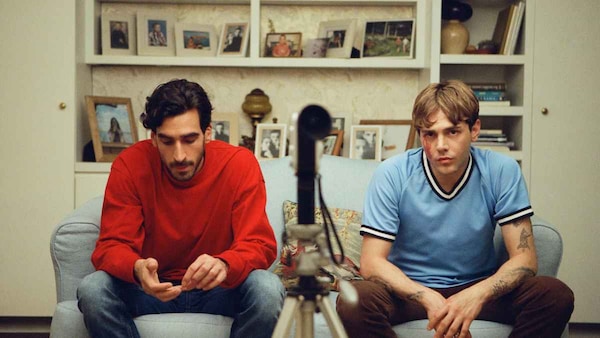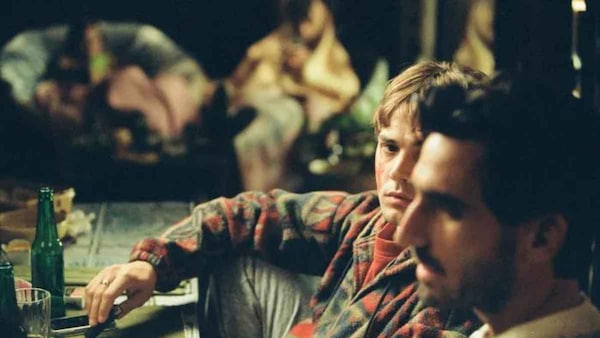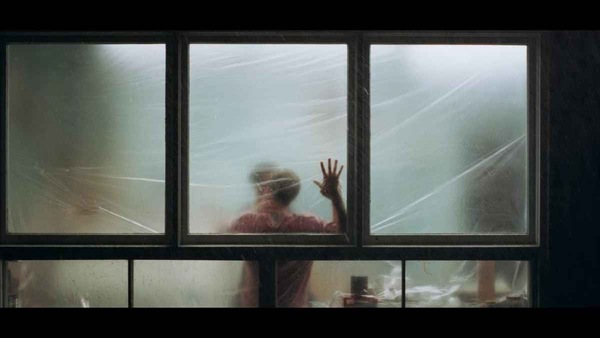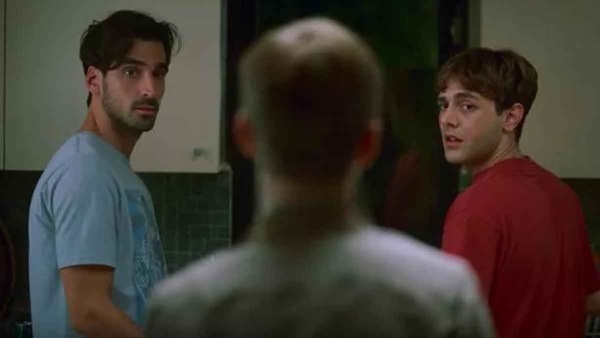Matthias & Maxime Review: Xavier Dolan delivers one of his finest, most tender, and wisest films
Who better than Dolan to potently and seductively sculpt a tale of queer male anguish and yearning?

Last Updated: 07.50 PM, Jul 13, 2024
Story: Two young men and lifelong friends, Matthias (Gabriel D’Almeida Freitas) and Maxime (Xavier Dolan), opt to act in a film made by their friend’s sister, Erika. But when one of the scenes requires them to ask, they find their friendship tested, as they are compelled to renegotiate the bounds of their intimacy with each other.

Review: The weight of a moment can be immense. The kiss Matt and Max share while performing in the short film sends their lives, and their emotional perspectives regarding one another into a tailspin, though it is Matt who appears most visibly perturbed. What follows is a classic tale of male denial, Matt consciously and deliberately attempting to curb and contain any emotion that has swept him up since the kiss. The kiss therefore is posited as the axis of this film about emotions in the churn, the shape of feelings changing and assuming their actual, long-repressed contours. As a storyteller, Dolan is interested in the gaps and elisions that are formed at the heels of a profound encounter, a sharply flashed hole in the understanding of one’s self, revealing unexplored connections. How do these elisions bear about a marked shift in perception of the self and the other? The film maps out a clear trajectory that is prompted interestingly after the two characters find themselves stretching the boundaries of their childhood friendship through a fictional intervention. The guise of cinematic fiction and its attendant role play reanimates the friends’ approach to each other through a prism whose messiness initially seems provoked to tear them apart.

The ripple effects triggered by that moment guide the film’s narrative and emotional thrust. It forces primarily Matt into a disorienting reconsideration of his relationship with Max. The latter is more open and unguarded in this regard, willing to have a conversation, even reminding Matt they had once kissed earlier in high school. Matt insists they hadn’t and he feels his assiduously nurtured sense of masculinity crumpling whenever anyone brings this up. He finds his hardened sense of identity almost slipping. The life with a hotshot corporate career he has built gets a lacerating dose of unfamiliarity. In the jolt the defining moment delivered him, he feels a rush of stark, dizzying sensations that constantly recalibrate the tension underlying any proximity with Max. He seeks to escape his feelings but they catch up with him. There is an awkwardness that has taken the place of sheer ease in being around Max. The feverish spell of confusion and uncertainty he experiences is also significantly connected to his having a female partner. Matt does not articulate the revealing impact of the kiss; as much as he attempts to keep it stifled hoping that would negate what he is feeling presently, the distancing he enacts to keep away from Max achieves a counterintuitive impulse of being even more drawn to Max.

For Max, it is his conflict with his addict chain-smoking mother (Anne Dorval, a Dolan regular), that keeps him on edge whenever he is home. As always, there’s the staple troubled mother-son relationship, with volcanically cataclysmic arguments between Max and his mother erupting right after a happy, peaceful meal they share. As sincere as Dorval is in these scenes, there is an unmistakable sense of fatigue, an uninspired tenor to the friction of such tumultuous, quickly vacillating relationships. We have seen variations of this template too often in his films and this one comes off as a tad too derivative and bland, despite the ball of fury the scenes burst with. So, in many ways, his friends and their mothers fill the space of family and tender love in his life that he didn’t get at home.

This brings one to the central ideas that swim through Dolan's films. As much as there are barely veiled ripostes to codified ideals and normative expectations of masculinity, the filmmaker explores how they essentially hijack the myriad, unwieldy ways of loving, while playfully widening the arena for defining and limiting relationships. One of the earliest shots in the film is of a billboard of the quintessential, white, heterosexual family replete with kids, that Max glances at. Over the course of the film, Dolan dislodges this idea of the family, intently turning to pitch warm, funny, biting and occasionally fight-laced portraits of male friendship. After the filming of the kiss, the film unfolds ostensibly within the span of the weeks leading up to Max’s departure for Australia for a bartending job. So, the urgency is spiked with yearning for the other; the two begin to recognise and legitimise. Dolan’s film is essentially circling a discovery of romance and by keeping the two characters apart, he is able to teasingly build the pining and passion, culminating in one of the most erotically suffused scenes in recent memory, where the lovers’ ache and longing is powerfully sublimated. Shot by Andre Turpin, a rain-specked windowpane frames an exquisitely charged moment of intimacy, set to Phosphorescent’s Song for Zula and making for one of the most gorgeous, swoony scenes.

Even as the imagery tends to get heavy-handed at times, bordering on repetitive shots of flickering, swirling and swaying leaves, the emotions remain deeply resonant . There are expectedly plentiful needle drops while the film curiously opts for a dialled-down tone. However, one can wrestle from the muted energy of a filmmaker working in a refreshingly relaxed vein. That characteristic stylized, flashy need to impress is absent, replaced with a sober, reflective strain more inclined to understand how the lines we draw between relationships aren’t exactly rigid and bound.
Verdict: With Matthias & Maxime, Xavier Dolan forays over familiar ground but without the raucous blinding and furiously reckless energy that has become synonymous with the young auteur. Here, there is something akin to a late-career maturity (ironic for a director barely in his early thirties) turning full blossom, utterly stunning, gently knowing and luminously open to introspection. It is the director’s best, most assured and emotionally sincere film since his 2014 breakout film, Mommy, landing one of the most winsome, flat-out charming endings that can dispel all his cynics.
WHERE
TO WATCH
Subscribe to our newsletter for top content, delivered fast.

